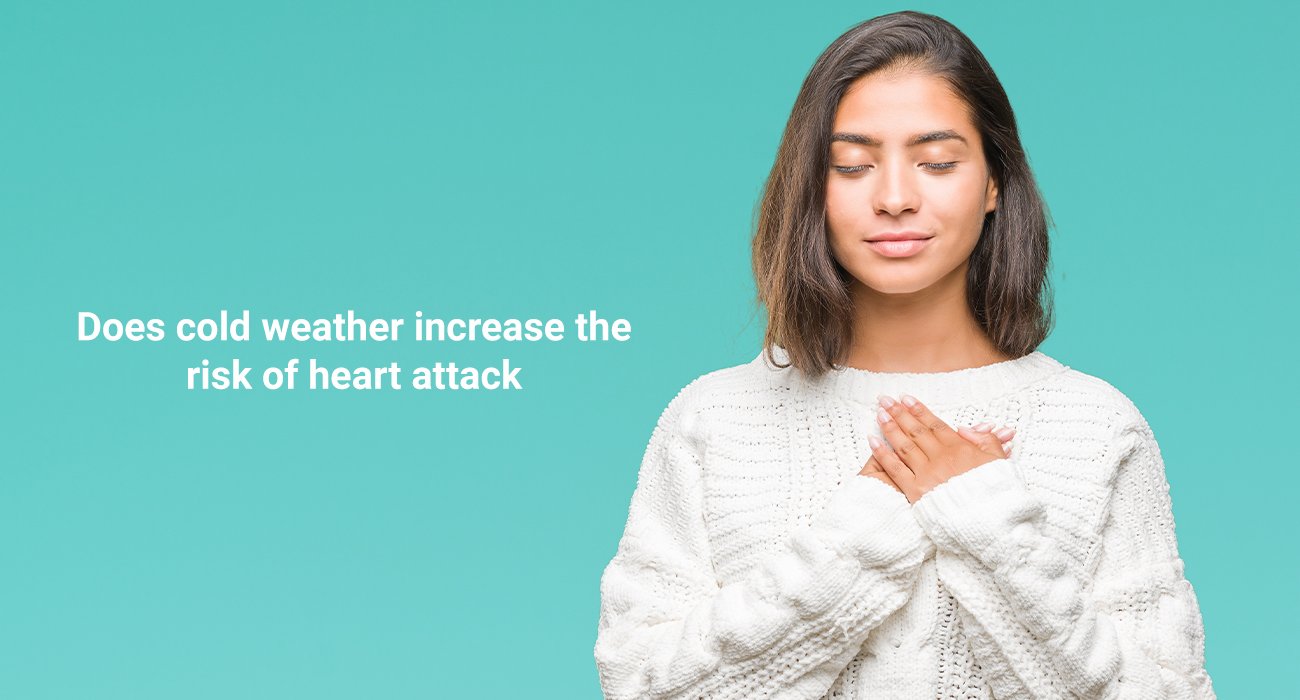Does Cold weather increase the risk of Heart attack
01/10/2023
Cold weather usually makes an individual more vulnerable to cardiac diseases such as heart attack. It usually occurs because the blood vessels become constricted in low temperature. This further increases blood pressure and reduces blood circulation that puts a lot of pressure on the heart. As a result the heart gets strained or worked out which may lead to heart failure. Whenever there is a blockage in the blood vessels which could be due to high cholesterol, accumulation of cholesterol or a blood clot. All these conditions cause sudden interruption of the blood flow to the heart which may lead to a cardiac arrest. In simple terms the Cardiologist classifies heart attack as an emergency situation as it deprives the body of oxygen and could be fatal to life. Also according to various studies it is found that the mortality rate due to cardiac diseases increases up to 50% in the cold. Also it is seen that most of the heart attacks occur during the winter season especially in the morning as during that time the temperature is extremely low. Thus, it restricts the arteries that further decreases the blood flow and the oxygen supply to the heart. As a result, there is a risk of blood clot formation due to sudden dip in the temperature.
People who have pre-existing cardiovascular conditions are usually at a very high risk of having a heart attack during cold weather. As the temperature decreases it puts on a lot of strain to the heart that affects the entire circulatory function and affects the cardiac system. According to heart doctors in Jaipur there are several preventive measures that can reduce the risk of having heart attack in winters. But before that it is necessary to identify the warning signs and symptoms of heart attack.
By knowing the signs one can help in preventing a life threatening condition. The warning signs and symptoms maybe from person to person, still some of the warning signs or symptoms may include:
- Dizziness
- Fatigue
- Heartburn
- Anxiety
- Chest pain
- Discomfort
- Heart palpitations
- Shortness of breath
- Pressure on chest
- Tightness in arms or neck
- Pain in jaw, chest, left arm and shoulders
- Cold sweat
- Lightheadedness
- Nausea
- Vomiting
Risk factors:
The possible risk factors of having a heart attack can be prevented by taking appropriate preventive measures. Expert cardiologists who specialize in providing best heart treatment in Jaipur usually advise to avoid any physical exertion during winters. Some of the risk factors of cardiac diseases may include:
Age
Hypertension
High blood cholesterol level
Family history
Diabetes
Obesity
Excessive alcohol consumption
Excessive smoking consumption of drugs
Consumption of diet that is rich in trans fat, saturated fats & cholesterol
All these factors may increase the risk of having cardiac arrest especially in cold weather. This causes blood vessels to constrict and build up the blood pressure.
Preventive measures:
In order to minimize the risk of having heart disease and heart attack during winters and decrease its effect one should follow these simple preventive measures.
One should try to keep their body warm and maintain a normal body temperature. There are a lot of cases where people suffering from cardiovascular diseases may require treatment such as heart valve repair surgery in Jaipur. To avoid such conditions one should try to maintain a healthy weight, eat healthy and seek medical help in case of any discomfort.
- One should keep the body warm by wearing layers of clothes, woolen cap socks and gloves so the body is warm enough.
- One should also avoid damp and cold areas. Also, you should take extra precaution from cold winds.
- In winters people who are habitual drinkers increase alcoholic consumption assuming that will keep their body warm. This in fact increases risk of having a stroke.
- In winters people try to exert themselves with physical activity assuming that it will keep their body warm. Though it does help in keeping the body warm, but it also puts a lot of pressure on the heart that may be life threatening for people who already have a heart disease. Therefore, one should do mild exercises or take walks instead. Regular breaks during exercise or walking are also necessary so that the body can regain its breath.
- Also try to stay indoors and avoid spending a long time outdoors when it is too cold.
- Wash your hands before eating and avoid touching their face as exposure to germs may cause respiratory infection and affect the circulatory system as well.

